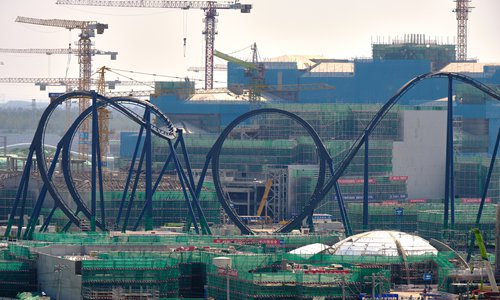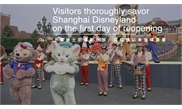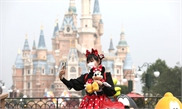Universal Beijing Resort progressing smoothly amid COVID-19, preparing to open in 2021

A roller coaster is under construction at the Universal Studios Theme Park in Tongzhou, Beijing. The park is scheduled to open in the spring of 2021. Photo: IC
Despite the COVID-19 pandemic, construction of the highly anticipated Universal Beijing Resort is progressing smoothly at its set pace, preparing to open next year.
Located in the capital's Tongzhou District, the resort, which is expected to set a new benchmark for the global entertainment and theme park industry, will help drive the recovery of local consumption, analysts said, noting that it shows foreign capital's faith in the Chinese market given the difficult period.
"The construction and preparatory work on Universal Beijing Resort is progressing smoothly. Our rides, shows, attractions and other facilities are currently under construction and testing as scheduled," Universal told the Global Times on Tuesday.
"Thanks to the support from government at all levels and our partners, we've made much progress in engineering, talent recruitment, technological innovation and infrastructure construction," the company said.
Smart drive
Before this year's May Day holiday, data equipment and facial recognition facilities provided by Alibaba Group had already been transferred to Universal Beijing Resort, and the two parties had completed the technology deployment of a private cloud, Chu Boyao, deputy general manager of Universal Beijing Resort, told media during a recent interview.
Alibaba Group and Universal Beijing Resort in October 2019 announced a strategic partnership to explore a next-generation theme-park experience through applications of innovative technologies and the digitalization of the entire resort.
For example, Universal Beijing guests will have the option of using Alipay's facial-recognition technology across the resort, from park entry and express-lane access to storage lockers and payments for merchandise and meals.
Universal's cooperation with Alibaba to forge an intelligent theme park will set a model for the industry as the future trend of digitalization will help improve efficiency in consumer experience, operations and corporate management, Beijing-based industry analyst Liu Dingding told the Global Times on Tuesday.
"The progress of Universal Beijing Resort has boosted confidence in the domestic services industry, which is seeing a gradual resumption of work as the country has contained the virus," Zhang Yi, CEO of Shenzhen-based iiMedia Research, told the Global Times on Tuesday.
"My friends and I are looking forward to the opening of Universal Beijing Resort as we need something to cheer us up amid the pandemic. The entertainment facilities in the theme park are also attractive as fans of Hollywood blockbusters will pour into the dreamland," a Beijing resident named Chen Guo told the Global Times on Tuesday.
"I also wonder if there will be some special measures when the theme park opens, as China is trying to normalize virus prevention and control measures," Chen said. "As there is still one year to go and COVID-19 vaccines are being tested, it is also possible that the opening will be normal."
Foreign faith
The resort project, which occupies about 400 hectares, was approved by the National Development and Reform Commission, China's top economic planner, in September 2014.
The resort is owned by the Beijing International Resort Co, a joint venture between the Beijing Shouhuan Cultural Tourism Investment Co and Universal Parks & Resorts, a business unit of Comcast NBCUniversal, media reported.
The theme park will have seven "lands": the Kung Fu Panda Land of Awesomeness, Transformers: Metrobase, Minion Land, the Wizarding World of Harry Potter, Jurassic World Isla Nublar, Hollywood and WaterWorld.
"The total demand of Chinese tourists is huge. We have full confidence in the Chinese economy and the tourism industry," the company told the Global Times on Tuesday.
Universal's opening will radiate to nearby tourism markets in North China and help advance the local tourism sector after the virus fallout, Zhang said, noting that since theme parks such as Disneyland in East China's Shanghai and Chimelong Safari Park in South China's Guangdong Province have their unique attractions, Universal's entry will diversify the Chinese theme park market despite industry competition.
Shanghai Disneyland reopened on May 11, having shut in January due to the COVID-19 epidemic. It first opened in the Chinese mainland in June 2016.
The Universal Beijing project was initially expected to advance related sectors such as catering, hotels and transportation, but the virus will inflict some temporary impact on those industries, Zhang said. "The impact will not be long-lasting as China has achieved progress in containing the virus and has strengthened efforts to resume work and production."
The operations of Universal theme parks have been affected by COVID-19 across the globe. Universal Orlando Resort has announced its theme parks will be reopening in phases from June 5, but the Universal park on the US' west coast has yet to announce reopening plans. The theme park in Japan remains closed.
The Beijing resort will make a positive contribution to the economic performance of Universal Parks & Resorts, experts said.
The number of trips by Chinese visitors to the Universal Beijing theme park is forecast to exceed 10 million in the first year, harvesting annual operating revenues of 8 billion yuan, Chinese news site sohu.com reported.
Experts said Universal's construction progress amid the COVID-19 pandemic also shows global capital's faith in the Chinese market. The Chinese government has sent positive signals during the ongoing two sessions to strengthen foreign investor confidence in China.
China's Commerce Minister said on Monday that the country will further open up its market to attract more foreign investment, through efforts like shortening its negative list and setting up a fair and transparent business environment.
"China is making important contributions to the global battle against the pandemic and the restoration of growth… We are glad to see the Chinese government has made arduous efforts in the fight against the pandemic, is determined to implement policies to safeguard its economy and has sent out signals to deepen market reform and further opening-up," Denis Depoux, global managing director of Roland Berger, told the Global Times.
The outbreak has shown the importance of the domestic Chinese market to many international companies; They realize that they are reliant on China as a manufacturing hub, and are not sufficiently tapping into the vibrant domestic consumption and services market, Depoux said.


